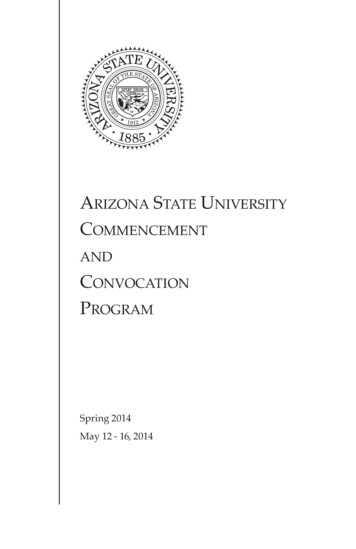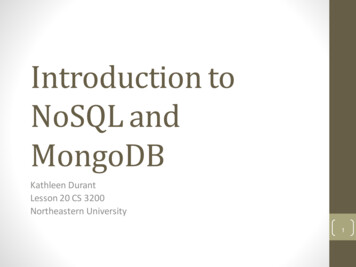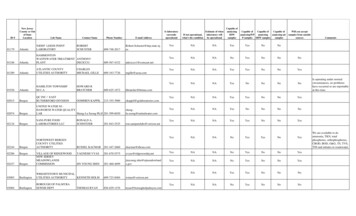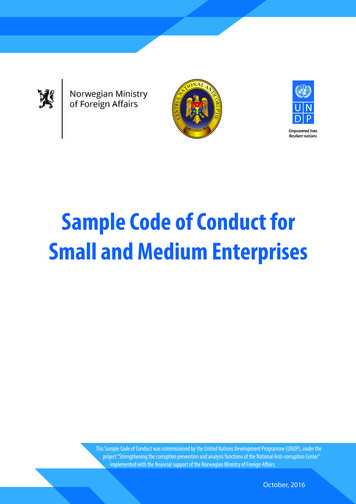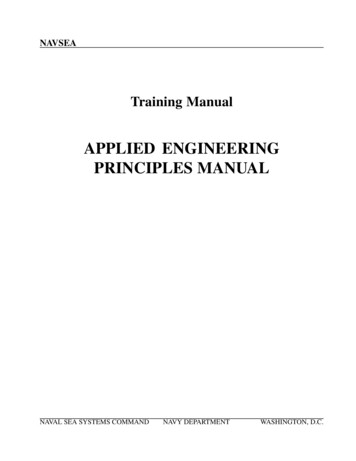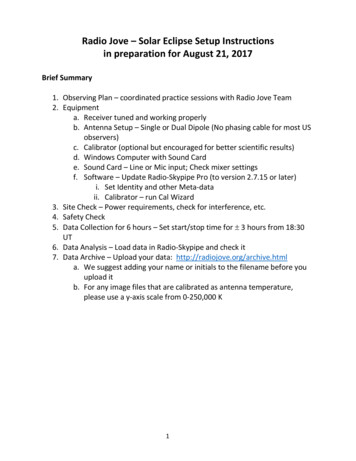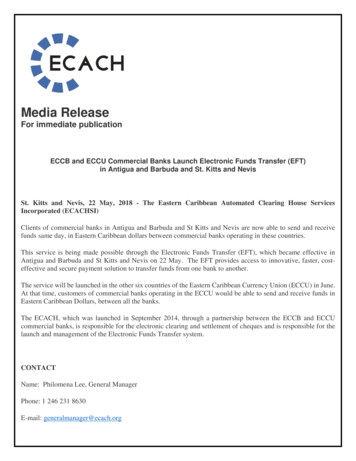
Transcription
Media ReleaseFor immediate publicationECCB and ECCU Commercial Banks Launch Electronic Funds Transfer (EFT)in Antigua and Barbuda and St. Kitts and NevisSt. Kitts and Nevis, 22 May, 2018 - The Eastern Caribbean Automated Clearing House ServicesIncorporated (ECACHSI)Clients of commercial banks in Antigua and Barbuda and St Kitts and Nevis are now able to send and receivefunds same day, in Eastern Caribbean dollars between commercial banks operating in these countries.This service is being made possible through the Electronic Funds Transfer (EFT), which became effective inAntigua and Barbuda and St Kitts and Nevis on 22 May. The EFT provides access to innovative, faster, costeffective and secure payment solution to transfer funds from one bank to another.The service will be launched in the other six countries of the Eastern Caribbean Currency Union (ECCU) in June.At that time, customers of commercial banks operating in the ECCU would be able to send and receive funds inEastern Caribbean Dollars, between all the banks.The ECACH, which was launched in September 2014, through a partnership between the ECCB and ECCUcommercial banks, is responsible for the electronic clearing and settlement of cheques and is responsible for thelaunch and management of the Electronic Funds Transfer system.CONTACTName: Philomena Lee, General ManagerPhone: 1 246 231 8630E-mail: generalmanager@ecach.org
ECACH EFT Frequently Asked QuestionsFAQsAnswers1. What is ACH?The ACH (Automated Clearing House) is the electronicpayment network that allows the clearing of electronicpayments between Financial Institutions. The EasternCaribbean Automated Clearing House (ECACH) is anelectronic network for clearing and settlement ofcheques and other electronic transactions within theeight territories of the Eastern Caribbean Currency Union(ECCU).2. What are the benefits of ACH?Transfers through the ACH are reliable. The system ismore secure, convenient and cost-effective and thetransaction time is faster than processing transfersmanually.3. What is EFT and how does it work?Electronic Funds Transfer is an authorized transmission offunds from or to accounts through the AutomatedClearing House. A company will send a list of transactionsto be made (e.g. on the accounts of its employees,clients, suppliers, etc.) to their Financial Institution. Thetransaction information should include the name of theaccount holder, the account number, the FI which holdsthe account of the receiver of the transaction and theamount to be paid or collected. Their Financial Institutionwill send these transactions in a specific format to theECACH for transmission to the banks at which theaccounts of these employees, clients, suppliers etc. areheld. The transactions can either be funds transferred toaccounts (e.g. salaries) or funds transferred fromaccounts (e.g. insurance premiums).4. Why are we launching EFT?The ECACH is launching EFT in an effort to provide thecustomers of banks within the ECCU with a faster, costeffective and secure payment solution and to ensure thatthe ECCU is innovating its payments systems in order toalign with international standards.
5. How would individual consumers benefitfrom the introduction of EFT on the ACH?Today some payments are still transmitted manually orusing more costly payment methods. With EFT, paymentswill be transmitted electronically, at a lower cost andmore quickly.6. What are the benefits of using EFT?This enhancement will provide bank customers with theability to transfer and settle funds between financialinstitutions in a number of more convenient ways e.g.through online banking. The process is secure, fast andconvenient.7. What is the impact of changing the usualmethod of payment to EFT and for whom?The impact of switching to EFT on the ACH for paymentswill be greatest for large companies that utilise expensivewire transfers and numerous cheques which must bestored. The use of EFT will provide a cheaper, faster andmore convenient option for sending or receiving funds.Their customers or employees will likewise be impactedas they will be able to receive funds or make payments ineasy, secure and fast method. It will eliminate the risksthat exists with the high use of cheques and cash.8. What is the action required and by whom? All businesses and individuals that are doing payrolltransactions via an FI and/or individuals that transfermoney or pay bills within the Eastern Caribbean areimpacted by the introduction of EFT. Through the new features of ACH business customerswill now have the opportunity to bring all transactions toone Financial Institution within the Eastern Caribbean. With EFT there is no longer a need to split their payrolland the way that people receive their money is changing.This can now be processed by one single FI.9. Who can have access to EFT Productsoffered by FIs?10. What types of transactions can I processusing ECACH’s EFT?Any of the member banks' corporate customers can haveaccess to EFT products. The EFT product will enable thetransmission of bulk payments (e.g. payroll, insurancepremiums, supplier payments etc.) and details on howthis product works and any associated charges should bedirected to your banker. Contact information for banksshould be included The transactions processed using ECACH/EFT includedebits and credits to savings and chequing accounts only.The following transactions can be sent through the
11. In which currencies will EFT transactions beallowed?ECACH/ECFH system - e.g. pension payments, dividends,utility payments, hire purchase payments etc. Pleasecheck with your financial institution, as products andservices may vary.EFT transactions to be exchanged across banks will beallowed in XCD currency only at this time.12. Can I make payments to any bank accountusing EFT?Payments can be made to any valid chequing or savingsaccount at any of the 16 commercial banks within the 8territories of the ECCU.13. How secure is the ECACH?The ECACH is very secure. Files in which transactions aresent are validated, digitally signed and encrypted whenthey are transmitted from a bank to the ECACH and fromthe ECACH to the receiving bank. Communications linksare also secure.14. How will confidentiality of informationexchanged across banks be maintainedunder the new EFT/ACH process?The ECACH uses encryption to protect the confidentialityof information transmitted through it. Each bank thatsends and receives payments through the ECACH takesspecial precautions to protect information. Access to thesystem is limited to only authorized personnel.15. Are there any limits to the number andvalue of EFT transactions that I canperform?There are no limits mandated by our Regulator at thistime however at your financial institution level theexistence of any limits should be discussed, as it can bean option to control the nature of the transactions thatcould be initiated.16. What if I make a mistake in the filesubmitted, how can I correct it?If an erroneous file or duplicate file is submitted by thecustomer, the financial institution (FI) must be contactedimmediately. The ACH Reversal Request must becompleted and the correct file must be made available tothe FI within 24 -48 hours of sending the initial file.Special care must be taken in ensuring that transactionsare correctly submitted. Reversals do not guarantee thatfunds will be returned.17. How will I recognize an Electronic FundsTransfer at my bank?EFT will appear as transactions on your bank statement orinternet/mobile banking. Funds sent by you from youraccount or funds collected from your account by anentity, such as a service provider, will appear as a debiton your internet banking or on your bank statement.Funds deposited to your account, such as salaries fromyour employer, will appear as credits. Transactions maybe identified by different descriptors such as the name of
the entity with which the transaction was made or thepurpose of the transaction etc.18. Are all Banks involved in ECACHProcessing?All commercial banks in the Eastern Caribbean CurrencyUnion (ECCU) are participants in the ECACH and aremandated to adopt EFT. All banks will therefore be ableto receive and send EFT messages on behalf of theirclients.19. How frequently will EFT transactions beBanks exchange EFT transactions each business dayexchanged between banks and how soonbetween 8:00am and 2:00pm. Clients can expect tocould beneficiaries expect to receive funds? receive funds the same day that their bank receives valuefor payment on behalf of their client.20. Will EFT transactions be subject to anycompliance or regulatory requirements?The commercial banks will continue to be governed byAnti-Money Laundering (AML) legislation applicable totheir respective jurisdictions. Therefore, all transactions,irrespective of the amount and medium for payment, willbe subject to AML scrutiny.
This service is being made possible through the Electronic Funds Transfer (EFT), which became effective in Antigua and Barbuda and St Kitts and Nevis on 22 May. The EFT provides access to innovative, faster, cost-effective and secure pay


